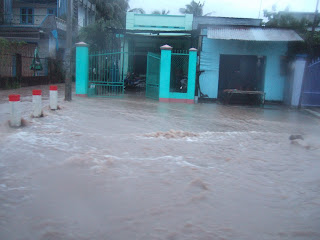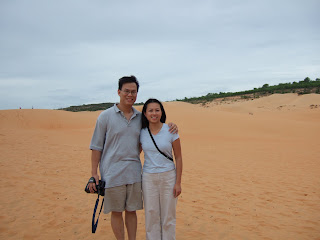
Mui Ne is part of the city Phan Thiet. The air was constantly humid from the sea breeze, and everything steel easily rusted. The main commerce was seafood and seashell souvenirs; those who didn't live on the waters sailed out early before dawn in motorboats or very tiny, round, basket-like boats made for one. They then docked on the shore near the beach-side resorts and offered to cook their catch for paying tourists. One of the puns for Mui Ne is "dodging mosquitoes," but they abounded in the resort area, along with "fire ants" that packed a mean sting. Note the abdomen-to-thorax ratio in the photo below. I have pictures to prove the aftermath of their sting, but I think I'll spare you.

The city Phan Thiet is the home of dragon fruits; we drove past acres of these adorable plants with thick, rope-like leaves hanging down like dreadlocks, the pinkish-red fruits peeking out like shy children from behind their mothers' skirts.

The sea was much saltier in Hon Rom than in Nha Trang, but the waves were much calmer, which made for a nice swim. After only 20 minutes, I tasted the sea at the back of my throat, a persistent bitterness mixed with the heavy saltiness that remained for the rest of the day. We returned our hotel room early and headed off to Saigon. On the way back, we dropped by Tung's grandpa's brother to pay a visit. Tung's grandma pretended to ask for shelter from the rain and waited to see if he recognized his sister-in-law.

Tung took 40 winks while his grandma finished her visitations.

We saw a baby cobra hugging one of the flower pots in front of the house. This is kind of a common thing. I'll spare you the details of what happened to that snake.

We also docked by the Champa ruins ("Thap Cham") to see red-clay ruins built by the Cham people, who sported colorful red head scarves for their traditional attire. The temples were made famous by a handsome poet and songwriter, Hang Mat Tu, whose sweet poetry wooed many beautiful women, but he never took a wife because he developed leprosy. In one of his famous songs, he proposed to sell the moon to anyone willing to buy it. Mong Cam, one of his lovers, died recently at over 90 years old. Up until her death, she would climb the worn roads up to the ruins, sit on the red bricks where once the famous poet sat, and write her own poetry, thinking of him.


Inside the temple, there was a little shrine on the floor with incense offerings. The interior felt cool and looked like a tall chimney, hollow and black all the way to the unseeable top.

The view at the back of the temple, overlooking the city of Phan Thiet and Mui Ne's sea in the distance, was truly spectacular, the stuff that inspires poetry and song.
















































